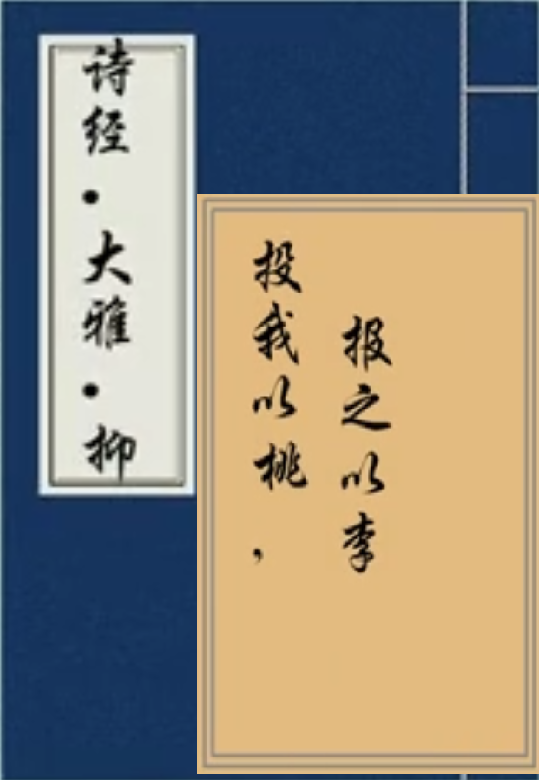Chinese Thanksgiving Culture

投桃报李
tóu táo bào lǐ
an idion from
"The Book of Odes"
(<诗经> Shījīng)
11th-6th century BC:
“You throw me a peach,
and I
give you a plum
in return.”
A metaphor for
friendly exchanges:
"Thanks + Giving back"

Thanksgiving Day (Gǎn'ēn jié感恩节) is originated from the U.S.A. In 1863, American president, lawyer and statesman Abraham Lincoln declared Thanksgiving as a National Holiday. In 1941, the US Congress officially designated the fourth Thursday of November each year as "Thanksgiving Day." The Thanksgiving holiday generally lasts from Thursday to Sunday. Thanksgiving is meant as the name tells, to show gratitude and thank people for what they have done and what they would mean. Because we all are grateful to certain people and things, this festival from America is loved by people all over the world. Different countries have different ways of celebrating.
China, although does not have a specific day as Thanksgiving Day, has however its own 'Culture of Gratitude' (Gǎn'ēn wénhuà 感恩文化). The culture of gratitude in China has a long history. Gratitude is the traditional virtue of the Chinese nation. Chinese culture has always valued “kindness” since ancient times. In the famous book "The Book of Odes" (Shī Jīng 《诗经》), dated 3000 years old, there are songs to describe the virtue of gratitude, one of them is the story of 'tóu táo bào lǐ 投桃报李', see above the explanation, and the illustration from Baidu.
Chinese culture has always attached great importance to "kindness" since ancient times, as expressed in above poem 'A traveller's Song' of Tang dynasty. Chinese culture of gratitude considers ‘benevolence and love’ as the basic human emotions that people need, which is reflected from the two corresponding Chinese characters of ‘benevolence and love’: 仁爱 Rén'ài. These two characters are the self-explanatory characters, which literally show a picture that two (二) people (亻) should be kind (open♥) to each other. Traditional Chinese cultures value implicit (hánxù 含蓄), and consider 'deeds' (xíng 行) more important than 'words' (yán 言). Chinese people usually feel uncomfortable to say the word ‘♥ài 爱’, especially when face to face. Instead, they buy others gifts, they pay visit, they write poems etc.
The idiom ‘to repay a peach for a plum’ (tóu táo bào lǐ 投桃报李) is widely used to thank the kindness. It means that we always repay goodwill with greater kindness. Chinese culture of gratitude is mirrored in a lot Chinese idioms, proverbs, colloquialisms, for example: ‘A drop of water in need, shall be returned with a spring in deed’ (Dīshuǐ zhī‘ēn, dāng yǒngquán xiāngbào. 滴水之恩, 当涌泉相报。) Another example: ‘Do not forget the person who digs the well when you drink.’ (Hēshuǐ búwàng wājǐngrén. 喝水不忘挖井人。) They let the strong feeling of ‘thanks and giving (back)’ (Gǎn'ēntúbào感恩图报) seen. The following is the most important Chinese ‘thanks and giving’ custom:
- repaying the grace of parenting, is called “filial piety” (Xiào 孝).
One of the most important representatives of Confucianism Mencius (372-289 BC) once said, "The filial piety is the most important thing to respect one's relatives"; - thank the Lord for the encounter (zhīyù知遇), men return with “loyalty” (Zhōng 忠);
- thank friends, men return with “righteousness” (Yì 义);
- thank husband or wife for love, men return with “kindness” (Ēn 恩).
Thanksgiving Day is approaching, please remember everyone who has ever helped you in your life. Life is flowing, some friends we ever have had, may never meet again. Let’s thank them. Please cherish this life.
I’d like to express my great gratitude to my families, to each of my friends, colleagues and business stakeholders, to all my students, classmates and teachers, to the neighbors, the casual encounters… especially those I cannot easily meet… Thank you, heartily, for your love, kindness, stories, your help and your trust, which have reshaped and inspired me and my life. Thank you.
Happy Thanksgiving Day!
Kitty Miao
Sources: Baidu Zhidao 百度知道, Laidou 来逗


